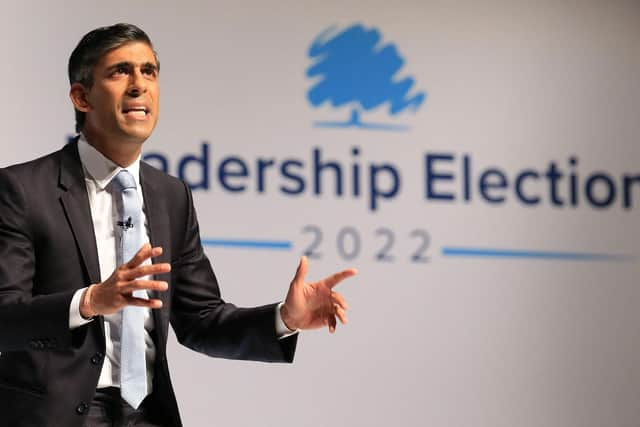How Rishi Sunak saying he took money away from ‘deprived urban areas’ jars with levelling up - Henri Murison
I found him personable, and later in my current job I spent time working with him on the economic challenges behind the North-South divide, helping him to bring these issues to the fore of Boris Johnson’s 2019 leadership bid.
His credentials as “the most Northern chancellor” that the Conservative party has had is a claim he has always stated with genuine pride.
Advertisement
Hide AdAdvertisement
Hide AdHe put into place much-needed Green Book reform to end the long-standing bias towards London and the South East for Treasury capital investment, which had seen Northern regions lose out on funding for decades.


He has also been hugely supportive of Teesside, Darlington and Hartlepool in particular, delivering a freeport and a new campus for the Treasury, and no doubt playing a crucial role in the success of Tees Valley Mayor Ben Houchen.
However, these achievements - which Sunak has drawn on heavily during his leadership campaign - jarred more than a little when a recording emerged a few weeks ago of him making the case for taking money away from “deprived urban areas” to spend in places like Royal Tunbridge Wells.
It was a revealing view of his own political instincts, one that risks undermining any significant legacy to the Northern Powerhouse – despite damage control attempts from his supporters insisting it had been a point about towns losing out in favour of large cities.
Advertisement
Hide AdAdvertisement
Hide AdPlaces like Middlesbrough on Teesside have lost as much as Bradford or Hull – the lost purchasing power of local government is undoubtedly undermining the devolution dividend, dwarfing any eventual freeport upside.
This week Liz Truss has also been caught out by remarks recorded from her time as Chief Secretary to the Treasury, saying British workers needed “more graft” to boost productivity.
The only truth in that is we do have a productivity problem in this country.
Analysis from the Northern Powerhouse Partnership of ONS regional productivity data found that London and the South East was 40 per cent more productive than the North.
Advertisement
Hide AdAdvertisement
Hide AdThis is the driving force between a gaping income gap, with Londoners earning £8,400 a year more (£37,500) than Northerners (£29,100) on average.
Where Truss is mistaken is that we know those divides are due to over-centralised government and chronic underinvestment in connectivity, education, skills and innovation - not “mindset and attitude”.
Until we drive up productivity and living standards in our poorest regions – a task made harder by the cuts to preventing greater social needs that Rishi Sunak was so proud of - we will continue to pay for the costs of economic failure.
Our persistent health inequalities keep people in hospital and out of the workplace, requiring more public spending.
Advertisement
Hide AdAdvertisement
Hide AdOur poor transport links continue to limit opportunities and hold back investment.
The disadvantage gap in education continues to damage our economy, preventing thousands of young people from finding skilled, well-paid work and reaching their potential.
Research from both NPP and the IFS shows that long-term disadvantaged children from ‘high impact’ backgrounds such as white and black Caribbean perform worse at school overall.
This year’s A-Level results shows Yorkshire and the North East falling even further behind in highest grades that London and South East due to regional differences in learning loss during the pandemic, as well as more recent failures in the government’s education recovery initiative, such as the poor delivery of the National Tutoring Programme.
Advertisement
Hide AdAdvertisement
Hide AdI predict with some certainty that GCSE results next week will show a similar story.
And yet I can’t help but be glad that the issue of productivity has come up.
Serious discussions about supporting sustained economic growth have been sorely lacking so far in this leadership race.
My message to both candidates is this: lack of ambition on the levelling up agenda is a false economy.
Advertisement
Hide AdAdvertisement
Hide AdNo support for local government, whose budgets are being hammered by spiralling inflation, will cost the central government more in the end.
Driving up Northern productivity will secure higher wages and tax revenue – reducing the subsidy the North currently needs for welfare spending, paid for by taxes raised in London.
Only large-scale investment, including infrastructure projects such as Northern Powerhouse Rail through Bradford, will be enough to catch up with London.
We need to reform and invest in public services to break the intergenerational cycles of deep poverty, not just because it’s the right thing to do but because it is the only way to fix our broken economy and country.
Henri Murison is chief executive of the Northern Powerhouse Partnership (NPP)